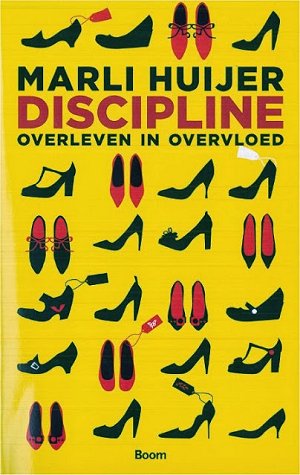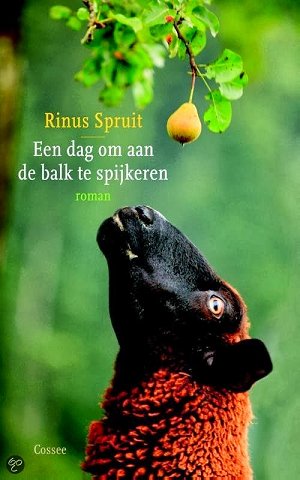Fleurs du Mal Magazine



Ton van Reen: Katapult, de ondergang van Amsterdam (05)
Kaspar zag dat een tiental witte muizen, zoals de laatste tijd gewoonte was geworden, tegen zijn zin aan de radio peuterde. Net zo lang tot ze een swingend muziekje hadden gevonden om op te dansen. Kaspar vond dat allemaal maar niks, al wist hij niet wat hij ertegen kon doen. Als het aan hem lag, mocht de bliksem in de radio slaan. Vroeger, toen die witten er nog niet waren, hadden ze het hier heel wat rustiger gehad. Toen kon je hier nog verstaanbaar praten. Tegenwoordig moest je steeds harder over de pop- en de schopmuziek heen schreeuwen. Het was allemaal de schuld van de witte muizen. Die hielden alleen van keiharde muziek en swing. Ze staken hun poten vol zilveren ringen, omdat ze graag pronkten met alles wat schitterde, en joegen ongegeneerd achter elk muizenvrouwtje aan, of ‘t zwart of wit was. Nee, van die witte muizen moest Kaspar niet veel hebben.
`Jullie muizen denken dat het hier altijd kermis is’, zei Bas, een paar glazen bier tappend.
`Je had het over ons?’ vroeg Kaspar. Hij rechtte zijn rug, want hij hoorde aan het klagerige toontje van Bas dat hij weer wat te kankeren had.
`Toen ik jou als eerste muis door de kroeg zag dartelen, dat is al weer een jaar of wat geleden, dacht ik: eigenlijk best een lief beestje. Zo zacht als een kat, zo aanhankelijk als een hond en zo klein dat je er geen omkijken naar hebt.’
`Ik ben blij dat je zo positief over me denkt’, zei Kaspar tevreden.
`En de manier waarop jij mijn hart hebt gestolen’, zei Bas schamper. `Vooral toen jij je liefdesdansje deed voor het tweede muisje dat hier binnenglipte. En er direct bovenop sprong. Je was een ongeduldige jongen hoor. Ik dacht: laat ze maar lekker hun gang gaan, als ze zich aan mij en de bezoekers niet storen.’
`Jij vlegel’, riep Kaspar verontwaardigd uit. `Wat jij over mij rondvertelt. Net of ik hier op de vloer heb liggen neuken. Straks vertel je nog dat alle zwarte muizen hoerenjagers zijn.’
`Wind je niet op’, suste Bas. `Ik wist niet dat jij zo preuts was geworden en dat je nu wilt vergeten dat je ooit jong bent geweest. En dat je dat ook heel goed hebt laten merken.’
`Stil toch’, zei Kaspar gegriefd. `Iedereen die oren heeft die hoort het. Ik wil niet dat dit soort verhaaltjes over mij of over andere zwarte muizen wordt verteld. Wij zijn niet als die witte muizen. Die rotzooien maar wat aan. Die mogen van jou alles.’
`Jullie mogen niks minder dan zij. Ik heb geen moment gemerkt dat ze meer kwaad deden dan de zwarte muizen. Alleen leven ze intenser dan jullie. Dat stoort jou.’
`Je zou toch beter op hen moeten letten’, zei Kaspar. `Het zijn jongens met een grote bek. Schone schijn. Ze belazeren óns ook. Ze pikken de beste stukken van de kaas en als je er wat van zegt, dan roepen ze, swing it out man, take your chance.’
Ton van Reen: Katapult (05)
fleursdumal.nl magazine
More in: - Katapult, de ondergang van Amsterdam, Reen, Ton van

Emily Bronte
(1818-1848)
No Coward Soul Is Mine
No coward soul is mine,
No trembler in the world’s storm-troubled sphere:
I see Heaven’s glories shine,
And faith shines equal, arming me from fear.
O God within my breast,
Almighty, ever-present Deity!
Life–that in me has rest,
As I–undying Life–have Power in Thee!
Vain are the thousand creeds
That move men’s hearts: unutterably vain;
Worthless as withered weeds,
Or idlest froth amid the boundless main,
To waken doubt in one
Holding so fast by thine infinity;
So surely anchored on
The steadfast rock of immortality.
With wide-embracing love
Thy spirit animates eternal years,
Pervades and broods above,
Changes, sustains, dissolves, creates, and rears.
Though earth and man were gone,
And suns and universes ceased to be,
And Thou wert left alone,
Every existence would exist in Thee.
There is not room for Death,
Nor atom that his might could render void:
Thou–Thou art Being and Breath,
And what Thou art may never be destroyed.
Emily Jane Brontë poetry
fleursdumal.nl magazine
More in: Anne, Emily & Charlotte Brontë, Archive A-B, Brontë, Anne, Emily & Charlotte

The Sorrows of Young Werther (07)
by J.W. von Goethe
22 May 1771
That the life of man is but a dream, many a man has surmised heretofore; and I, too, am everywhere pursued by this feeling. When I consider the narrow limits within which our active and inquiring faculties are confined; when I see how all our energies are wasted in providing for mere necessities, which again have no further end than to prolong a wretched existence; and then that all our satisfaction concerning certain subjects of investigation ends in nothing better than a passive resignation, whilst we amuse ourselves painting our prison-walls with bright figures and brilliant landscapes,–when I consider all this, Wilhelm, I am silent. I examine my own being, and find there a world, but a world rather of imagination and dim desires, than of distinctness and living power. Then everything swims before my senses, and I smile and dream while pursuing my way through the world.
All learned professors and doctors are agreed that children do not comprehend the cause of their desires; but that the grown-up should wander about this earth like children, without knowing whence they come, or whither they go, influenced as little by fixed motives, but guided like them by biscuits, sugar-plums, and the rod,–this is what nobody is willing to acknowledge; and yet I think it is palpable.
I know what you will say in reply; for I am ready to admit that they are happiest, who, like children, amuse themselves with their playthings, dress and undress their dolls, and attentively watch the cupboard, where mamma has locked up her sweet things, and, when at last they get a delicious morsel, eat it greedily, and exclaim, “More!” These are certainly happy beings; but others also are objects of envy, who dignify their paltry employments, and sometimes even their passions, with pompous titles, representing them to mankind as gigantic achievements performed for their welfare and glory. But the man who humbly acknowledges the vanity of all this, who observes with what pleasure the thriving citizen converts his little garden into a paradise, and how patiently even the poor man pursues his weary way under his burden, and how all wish equally to behold the light of the sun a little longer,–yes, such a man is at peace, and creates his own world within himself; and he is also happy, because he is a man. And then, however limited his sphere, he still preserves in his bosom the sweet feeling of liberty, and knows that he can quit his prison whenever he likes.
The Sorrows of Young Werther (Die Leiden des jungen Werther) by J.W. von Goethe. Translated by R.D. Boylan.
To be continued
fleursdumal.nl magazine
More in: -Die Leiden des jungen Werther, Goethe, Johann Wolfgang von
![]()
La double vie de Véronique
Bij de film van Krysztof Kieslowski
Een ogenblik pal: het lijkt een jaar te duren.
Zij schroeit zich aan haar eigen beeld – zonder
spiegel, lensloos zelfs. Ziel vanwege onvermoede
dubbelgangster tot in eeuwigheid verscheurd.
Daar zit ze uit het venster van een trein te turen:
het vertekent, maakt strakke vormen ronder
en haar voor nog eens zo’n herkenning op haar hoede.
Zij weet zichzelf in duplo nu. Avondval verkleurt
de stad, werpt vreemde schaduwen op muren.
Ach Veronika, wat ga je mooi in zang ten onder.
Bert Bevers
fleursdumal.nl magazine
More in: Archive A-B, Bevers, Bert

VPRO BOEKEN met
Rinus Spruit & Marli Huijer
Van de zesjescultuur tot het toegeven aan verlokkingen: veel problemen van onze tijd kunnen worden verholpen worden met een beetje meer discipline, zo betoogt filosoof Marli Huijer in haar boek Discipline. Overleven in overvloed.

Schrijver Rinus Spruit, die eerder een boek schreef over zijn vader die rietdekker was, portretteert in zijn roman Een dag om aan de balk te spijkeren Maarten Rietgans, de zoon van een keuterboer, die bang is voor vrouwen.
VPRO Boeken wordt aanstaande zondag (2 februari) uitgezonden op Nederland 1, van 11.20 tot 12.00 uur.
fleursdumal.nl magazine
More in: - Book News, Art & Literature News

Maurice Du Plessys
(1864-1924)
La chanson d’un soir de tempête
J’ai sablé le vin, j’ai humé les roses ;
J’ai cueilli la fleur du plus beau baiser :
Je ne trouve plus au fond de ces choses
De quoi me griser…
Les jours ont brillé sur ma tête pâle
Sans m’apprendre rien du Tout qu’il y a :
Mon coeur m’apparaît comme sort d’un châle
Un camélia…
Jeunesse, éclair ! jours enfuis comme un rêve !
Flambeaux morts de gloire en cendre à mes pieds,
Le Temps vous a pris comme un aigle enlève
Les sanglants ramiers !
A mes pieds, des flots ô plèbe insultante !
Du lâche Destin prête-nom menteur !
Arrière, Avenir qu’attend sous la tente
Achille et mon coeur !
Passions, passé, crache ça, mon âme,
Comme ces hauts cieux d’éclairs déchirés
Vident par cent trous dans les eaux leur flamme :
Homme, ici mourez !
Non, vivons ! Mais si, dans l’atroce lutte,
Je dois au vain flot céder le terrain,
A ma lèvre expire en silence, Ô flûte
Morte dans l’airain !
Maurice Du Plessys poetry
fleursdumal.nl magazine
More in: Archive O-P, CLASSIC POETRY
Thank you for reading Fleurs du Mal - magazine for art & literature